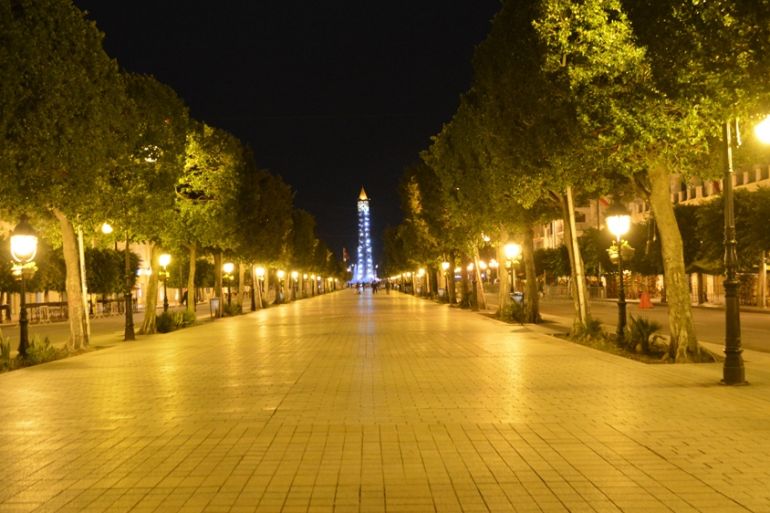Tunisia film festival opens doors in show of defiance
Carthage Film Festival director says event will continue despite widespread fear and curfew after latest violence.

Tunis, Tunisia – Organisers at a major film festival in the Tunisian capital say they will not cancel screenings despite a bloody bombing that killed 13 members of the security forces less than 24 hours earlier.
The 26th annual Carthage Film Festival (JCC), which opened in Tunis on Saturday and also takes place in a dozen other cities across the country, reopened its doors at 6pm local time on Wednesday and will screen about 600 new films over the next week.
Keep reading
list of 4 itemsUK has begun mass arrests of potential Rwanda deportees: What’s next?
World Press Freedom Day: Gaza conflict deadliest for journalists
Israeli firms sold invasive surveillance tech to Indonesia: Report
On Tuesday evening, a bomb tore through a bus carrying presidential guard soldiers along the Mohamed 5 Boulevard in central Tunis, leaving 13 dead and at least 17 others wounded, including civilians.
|
|
| State of emergency declared in Tunisia following bomb attack |
The Islamic State of Iraq and the Levant (ISIL) claimed responsibility for the attack.
After the blast, Tunisian President Baji Caid Essebsi quickly declared a 30-day state of emergency and imposed a night-time curfew on much of the capital.
But JCC director Ibrahim Letaief said the film festival would continue despite widespread fear and the curfew.
RELATED: Tunisia hosts World Social Forum
“They targeted the security forces,” he told Al Jazeera, “but they seized the moment of the festival.
“The capital is full of foreigners and Tunisians and cinemas were packed,” Letaief said, adding that 58 nationalities were among the attendees.
“It is the happy atmosphere of Tunis that was also targeted. So, when I think about it, the film festival was targeted too.”
When news of the attacks broke, Letaief took the microphone at a cinema on Habib Bourguiba Avenue in central Tunis and informed the audience.
“People were scared, but we decided the festival would continue,” he said.
The JCC director said they had received an outpouring of support, with Tunisians and foreigners alike “telling us they would stay to support Tunisia, its art, its culture and the festival.”
Ayman Sheikhani, a Syrian director from Damascus, was one of the artists at the festival.
“We are proud that this kind of festival can still take place despite the situation,” he told Al Jazeera. “All Arab countries are going through this now.
RELATED: US offers support – but Tunisians need more than money
“The violence in the streets cannot stop this kind of cultural event. I will stay till the end of the festival.”
Lemohang Jeremiah Mosese, a Berlin-based film director who is from Lesotho, said he was “moved” by Tunisians’ refusal to cancel the festival.
“After the attack, I thought I should go home and was going to stay in the hotel until we left,” he told Al Jazeera.
“When I was waiting outside the cinema and saw people coming, my heart was moved. People here [in Tunisia] don’t let this [attack] stop them from living.”
![Director Lemohang Jeremiah Mosese says he was inspired by Tunisians' resolve not to let their daily lives halt after the attack [Emir Sfaxi/Al Jazeera]](/wp-content/uploads/2015/11/9e7a92388b354672be230b52bca84af8_18.jpeg)
The bombing was the third major attack to strike the country this year and one of several to have taken place since Tunisians toppled the 23-year presidency of Zine El Abidine Ben Ali in 2011.
In June, gunmen killed 38 European tourists at a beach resort hotel in the coastal city of Sousse.
ISIL said it had carried out the attack, while government officials claimed the perpetrator was the local armed group Ansar al-Sharia.
Three months earlier, armed men targeted the Bardo National Museum, which left 22 people dead, most of them foreign tourists. The attack is believed to have been carried out by Okba Ibn Nafaa, a local affiliate of al-Qaeda.
Back at the Carthage Film Festival, Tunisian director Nouri Bouzid recalled being threatened by Tunisia-based armed groups several times.
“The attackers are people who want chaos for the country,” he told Al Jazeera. “But no one left the festival. Nothing changed apart from rescheduling movies to fit the curfew times.”
With additional reporting by Patrick Strickland